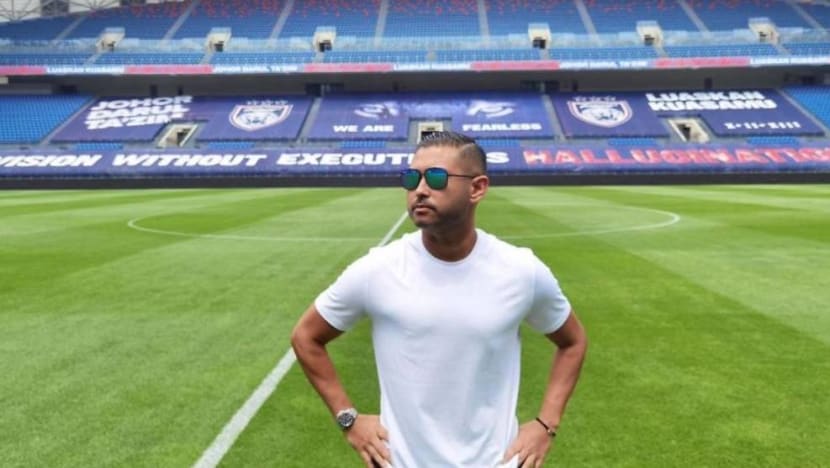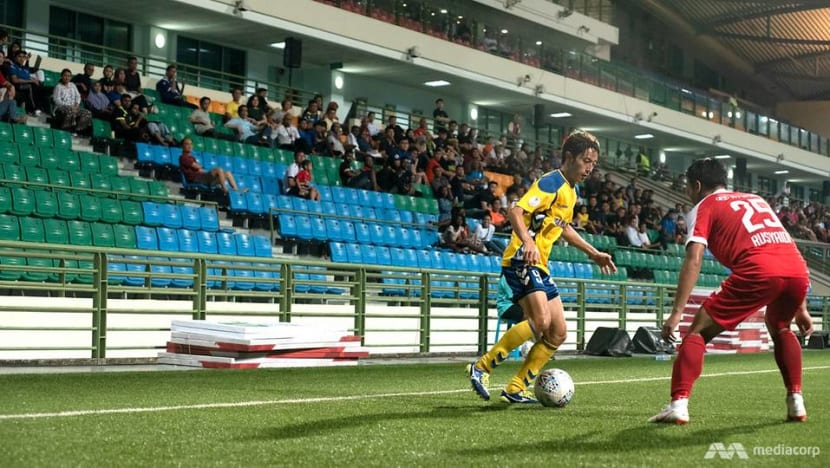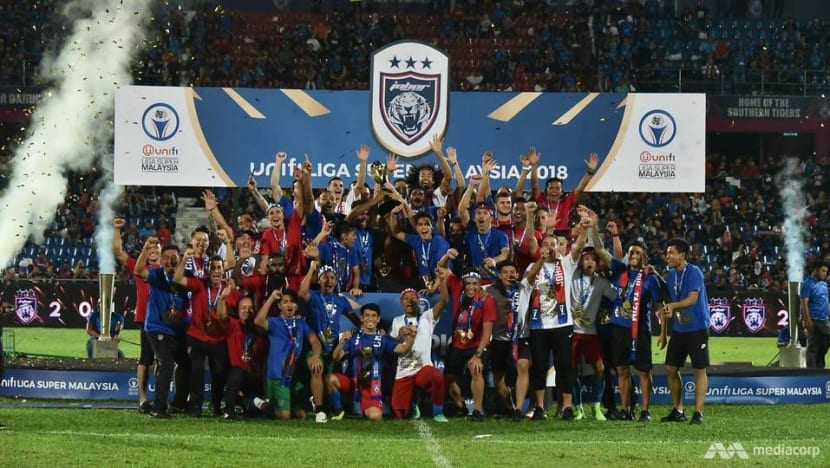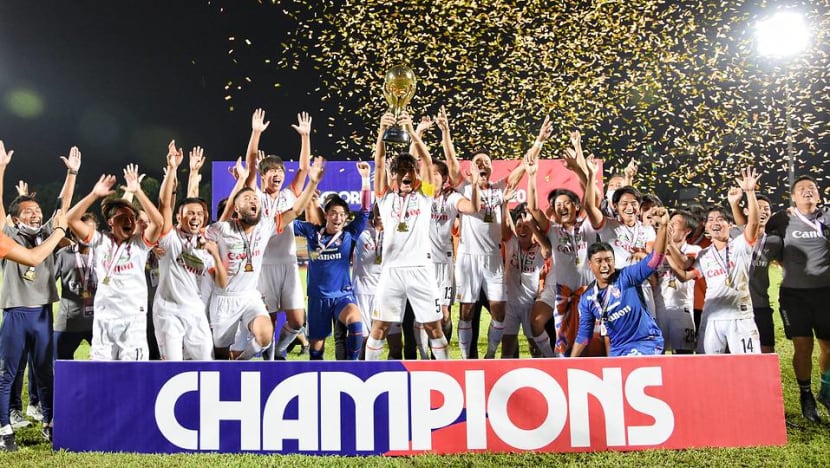Commentary: Johor playing in the Singapore Premier League – does it make sense?
Exploring greater exchanges with Malaysian football could be sensible but any such collaboration has to be for the benefit of football in both countries, says John Duerden.

Johor crown prince Tunku Ismail Sultan Ibrahim owns Malaysian Super League champions Johor Darul Ta'zim. (Photo: HRHcrownprinceofJohor/Instagram)
SINGAPORE: Remember the days the Kallang Roar filled the National Stadium when Singapore’s football team participated in the Malaysia Cup?
Many can’t forget how the likes of Abbas Saad, Fandi Ahmad, V Sundramoorthy and others combined to bring sporting glory and bragging rights to Singaporeans over friends and relatives across the Causeway.
So Johor Crown Prince Tunku Ismail Sultan Ibrahim’s recent suggestion of another Malaysia-Singapore football collaboration did not sound out of the ordinary, but it certainly invoked nostalgic memories of Singapore’s past involvement in the Malaysia Cup.
Since that famous Lions’ victory in the 1994 Malaysia Cup final against Pahang at the Shah Alam Stadium, Singapore exited the Malaysian footballing sphere in a bid to focus on its own domestic competition.
However, some exchanges between both countries in the football arena continued.
From 2012 to 2015, LionsXII, a team from Singapore, participated in the Malaysia Super League in return for a young team heading the other way. In some ways, the Lions were too successful for both parties.
The team won the league in 2013 and the Malaysia Cup two years later. In 2015, Malaysia ended the arrangement, I suspect partly because of the success of the Lions and the underwhelming presence of the young Tigers over the border -though this was never publicly admitted.
READ: Commentary: Euro 2020 - France stands in the way of Ronaldo’s swan song
On the other side of the Causeway, the Singapore Premier League (SPL) has also seen its share of foreign teams participating over the years. It wasn’t just the Malaysians but also teams from China, South Korea, France and Africa all competing at some point in time.
Of the last six championships, two have been won by DPMM, a team from Brunei that has chosen to sit out this season owing to COVID-19 travel restrictions, and four by Albirex Niigata, a satellite of a club in Japan.
WIDENING THE POOL
There is little evidence the presence of these foreign clubs has boosted the quality of local teams, with Parliament Secretary for Culture, Community and Youth Eric Chua acknowledging Singapore has not been doing well in football in recent years in March.

Yet, Singapore is more receptive than most to the idea of foreign involvement in football to widen the pool of quality competition and also to increase the profile of the domestic competition.
But that does not mean the idea from Tunku Ismail is the right one. His Malaysian Super League team Johor Darul Ta’zim (JDT), would probably like to see their Under-21 team participate in the SPL.
"Now we have been discussing with the Football Association of Singapore (FAS) to send JDT III to play in the Singapore league because we want to give more competitive games to our young players. Right now, they aren't getting much competitive games in Malaysia," said Tunku Ismail, who is also President of JDT.
"So we are still discussing and I hope they will be absorbed and be given the opportunity to participate.”
READ: Commentary: Johor crown prince could take Valencia in the right direction
The benefits for JDT in sending their Under-21 team to compete among seasoned international and professional players here is obvious, as Tunku Ismail explained. But Singapore’s football administrators may be wary in committing to such a proposal.
FAS chairman Lim Kia Tong said in a statement that the association “will extensively review any written application if received, to join the SPL, taking into account the interests of Singapore football, before any decision is made.”
READ: Commentary: From the unknown to world beaters, here’s how Malaysia raises superstar athletes
JDT A MAJOR FORCE
Mr Lim’s veiled admission that the interests of local football need to be given priority in any such collaboration is particularly striking.
The thing is, the JDT is not just any team from Malaysia but the dominant force in the country. That presents both pros and cons for the SPL.
Investment from 2012 in what was a mediocre team has won the club the last seven Malaysian Super League titles, also making them an established figure in the Asian Champions League.

Since the JDT’s success is built not just on expensive imported players but on investing in facilities, staff, marketing and youth development, the club has become an example to follow for clubs in Southeast Asia as its professional set-up mirrors Europe’s football clubs.
On that note, having one of their teams compete in the SPL could be a positive for Singapore football, according to Darwin Jalil, the vice-chairman of SPL club Balestier Khalsa and FAS council member.
“Their (JDT) level of professionalism and standard of coaching within the team can bring positivity to the league," Jalil said. Their addition would also mean more much-needed games and competitiveness for the local teams.
At the very least, the addition of JDT III would increase variety in the SPL and also enhance its commercial viability. There would presumably be some interest in Malaysia, and the country’s large football market, which could lift the profile of Singapore’s league.
Adding an element of the Malaysia-Singapore rivalry could also get the media talking and fans excited even if the effect would likely be limited as this is a young JDT team.
READ: Commentary: Can football deliver Singapore its sporting pride?
READ: Commentary: Let the children play - Singapore's 'best chance' to achieve football success starts in its schools
POTENTIAL EMBARASSMENT
But the JDT’s quality, albeit a younger team, could also be a source of embarrassment for Singapore football. Despite their inexperience, the talented Johor youth team will likely add to the overall strength of the league but they could also be too strong for the competition here.
Young JDT players have accolades under their belt, having clinched the Under-15 International Cup in 2019. They also go through coaching programmes with other professional football clubs including Valencia and Bundesliga club Borussia Dortmund.
If, as could happen, these young group of players ended up champions of Singapore, it would be a major embarrassment for the country and, surely, an even bigger turn-off for fans.
Some reciprocity – such as the JDT team competing here agreeing to field a certain number of Singaporean players - could make it a more palatable and equitable proposition.
But this is unlikely to be more than lip service. Niigata’s haul of all four domestic trophies in 2016 was seen as a wake-up call for Singapore football and led to calls for more local players to be involved in the Japanese team.

But while there are several in the Albirex squad, the overwhelming majority of minutes go to Japanese players.
SINGAPORE FIRST?
"A strong domestic league will produce a strong national team and local players of good quality,” former Singapore goalkeeper Shahril Jantan said. “It will provide the national team with a good base to begin with. So how would the inclusion of JDT III play a role in that ecosystem of producing quality local players?"
That the Singapore national team needs help has become even more apparent after recent games in qualification for the 2022 World Cup. In a five-team group that ended on Jun 15, the Lions not only lost to Asian powerhouses Saudi Arabia and Uzbekistan, but also struggled against weaker teams Yemen and Palestine.
READ: Commentary: World Cup 2034 may seem like a long shot but Singapore can surely get behind this dream
Clearly, Singapore football needs a boost and that lifeline may come from a more vibrant domestic league. To that end, exploring greater exchanges with Malaysian football could be sensible but any such collaboration has to be for the benefit of both parties.
As it stands, the JDT III’s participation in the SPL could benefit the Malaysians more than Singapore football.
John Duerden has lived in Asia for 20 years and covers the region’s sporting scene. He is the author of three books including Lions & Tigers - The History of Football in Singapore and Malaysia (2017).















